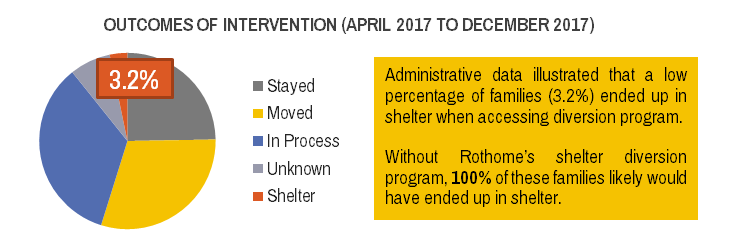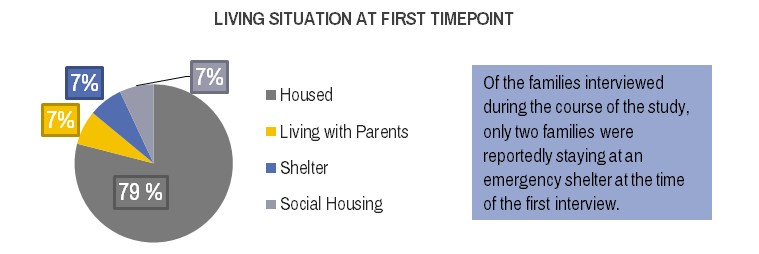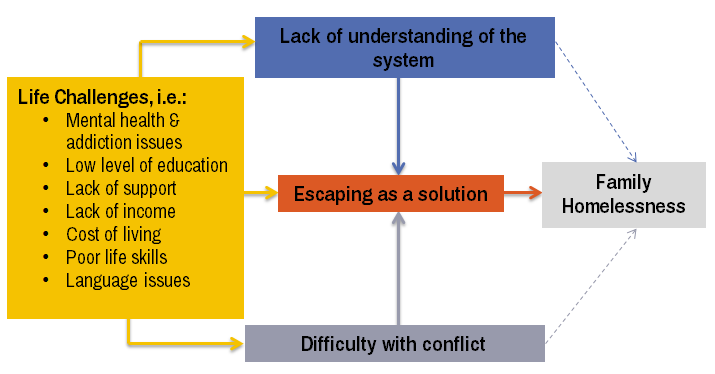The Prevention of Homelessness Among Families (PHAF) Evaluation Project
a.k.a. Family Matters in London, Ontario: Understanding and Addressing Family Homelessness
This Prevention of Homelessness Among Families (PHAF) project evaluated a shelter diversion program piloted at Rotholme Women’s and Family Shelter in London, Ontario (a division of Mission Services). In 2015, the pilot program received one year of funding to hire a Housing Crisis Worker to assist families at imminent risk of homelessness. With funding from the Local Poverty Reduction Fund, the program was extended for an additional year so that it could be properly evaluated by researchers at the Lawson Health Research Institute.
PILOT PROGRAM: Shelter Diversion Model

EVALUATION: Sources of Data
- Administrative data from Rotholme capturing the total number of families who accessed the pilot program, as well as the outcomes of the program (i.e., what percentage ended up in shelter vs. housing)
- Interviews with parents of families who accessed Rotholme’s pilot program. Interviews were conducted at 4 time points, approximately 6 months apart, and included measures of housing stability, service use, quality of life and other health indicators.
- Focus groups with families staying at Rotholme who did not access the pilot program. The focus groups explored the causes of and potential solutions for homelessness.
- Focus groups with staff working at Rotholme, to elicit their perspectives on 1) the causes of, and solutions for, homelessness; and 2) the benefits and challenges of the pilot program.
EVALUATION: Key Findings



CAUSES OF HOMELESSNESS
Focus groups were conducted separately with Rotholme staff and families experiencing homelessness. Both of these participant groups identified several key factors that would predispose families to homelessness:

Participants identified that families at risk of homelessness may have difficulty with understanding the system (i.e., due to language barriers), as well as difficulty with conflict resolution. Families at risk of homelessness may also need coping strategies beyond leaving difficult situations geographically.
CONCLUSION
Family homelessness is a serious problem that can be prevented with early intervention. This evaluation project found Rotholme’s pilot program to be successful at preventing homelessness in the short term. Administrative data illustrated that a low percentage of families ended up in shelter when accessing the diversion program. Furthermore, families who accessed the intervention were able to maintain housing at 18-months follow up. In the long-term, we believe this intervention can be implemented in municipal hubs and that this will reduce homelessness among families in London, saving money through a reduction in shelter costs.
PRESS
Pilot project to divert families away from emergency shelters in London a success (Global News Radio, February 2018)
Early help at shelters cut homelessness, study finds (London Free Press, February 2018)
Program to Prevent Family Homelessness a Success (Blackburn News, February 2018)
PARTNERS

 |
Rotholme Women’s and Family Shelter:Gordon Russell (Director of Shelters)Mission Services of London 42 Stanley Street, London, ON, N6B 1R3 City of London:Jan Richardson (Former Manager, Homeless Prevention)Neighbourhood, Children, and Fire Services 151 Dundas St., PO Box 5045, London, ON, N6A 4L6 |
CONTACT
 |
For more information about the project, please contact: Lawson Health Research Institute:Cheryl Forchuk, RN PhD (Principal Investigator)Beryl & Richard Ivey Research Chair in Aging, Mental Health and Rehabilitation Parkwood Institute, Main Building, B3-110 550 Wellington Road South, London, ON, N6C 0A7 (519) 685-8500 x 77034 cforchuk@uwo.ca Bryanna Lucyk (Research Coordinator) Mental Health Nursing Research Alliance Parkwood Institute, Main Building, B3-110 550 Wellington Road South, London, ON, N6C 0A7 (519) 685-8500 x 77097 bryanna.lucyk@lhsc.on.ca |
© 2019